Assignment on Micro-nutrient deficiency in pregnancy
VerifiedAdded on 2022/09/12
|10
|2677
|13
Assignment
AI Summary
Contribute Materials
Your contribution can guide someone’s learning journey. Share your
documents today.
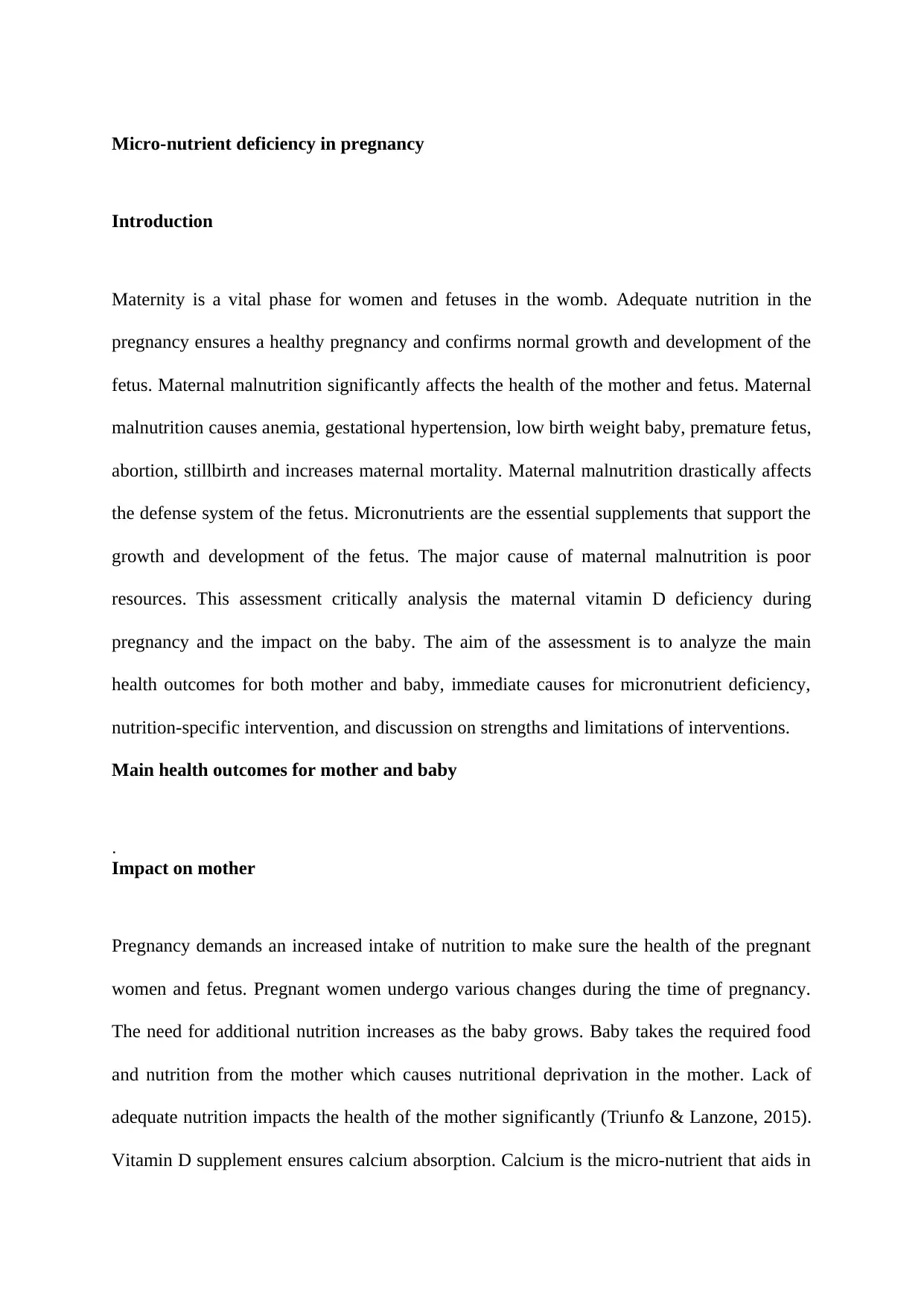
Micro-nutrient deficiency in pregnancy
Introduction
Maternity is a vital phase for women and fetuses in the womb. Adequate nutrition in the
pregnancy ensures a healthy pregnancy and confirms normal growth and development of the
fetus. Maternal malnutrition significantly affects the health of the mother and fetus. Maternal
malnutrition causes anemia, gestational hypertension, low birth weight baby, premature fetus,
abortion, stillbirth and increases maternal mortality. Maternal malnutrition drastically affects
the defense system of the fetus. Micronutrients are the essential supplements that support the
growth and development of the fetus. The major cause of maternal malnutrition is poor
resources. This assessment critically analysis the maternal vitamin D deficiency during
pregnancy and the impact on the baby. The aim of the assessment is to analyze the main
health outcomes for both mother and baby, immediate causes for micronutrient deficiency,
nutrition-specific intervention, and discussion on strengths and limitations of interventions.
Main health outcomes for mother and baby
.
Impact on mother
Pregnancy demands an increased intake of nutrition to make sure the health of the pregnant
women and fetus. Pregnant women undergo various changes during the time of pregnancy.
The need for additional nutrition increases as the baby grows. Baby takes the required food
and nutrition from the mother which causes nutritional deprivation in the mother. Lack of
adequate nutrition impacts the health of the mother significantly (Triunfo & Lanzone, 2015).
Vitamin D supplement ensures calcium absorption. Calcium is the micro-nutrient that aids in
Introduction
Maternity is a vital phase for women and fetuses in the womb. Adequate nutrition in the
pregnancy ensures a healthy pregnancy and confirms normal growth and development of the
fetus. Maternal malnutrition significantly affects the health of the mother and fetus. Maternal
malnutrition causes anemia, gestational hypertension, low birth weight baby, premature fetus,
abortion, stillbirth and increases maternal mortality. Maternal malnutrition drastically affects
the defense system of the fetus. Micronutrients are the essential supplements that support the
growth and development of the fetus. The major cause of maternal malnutrition is poor
resources. This assessment critically analysis the maternal vitamin D deficiency during
pregnancy and the impact on the baby. The aim of the assessment is to analyze the main
health outcomes for both mother and baby, immediate causes for micronutrient deficiency,
nutrition-specific intervention, and discussion on strengths and limitations of interventions.
Main health outcomes for mother and baby
.
Impact on mother
Pregnancy demands an increased intake of nutrition to make sure the health of the pregnant
women and fetus. Pregnant women undergo various changes during the time of pregnancy.
The need for additional nutrition increases as the baby grows. Baby takes the required food
and nutrition from the mother which causes nutritional deprivation in the mother. Lack of
adequate nutrition impacts the health of the mother significantly (Triunfo & Lanzone, 2015).
Vitamin D supplement ensures calcium absorption. Calcium is the micro-nutrient that aids in
Secure Best Marks with AI Grader
Need help grading? Try our AI Grader for instant feedback on your assignments.
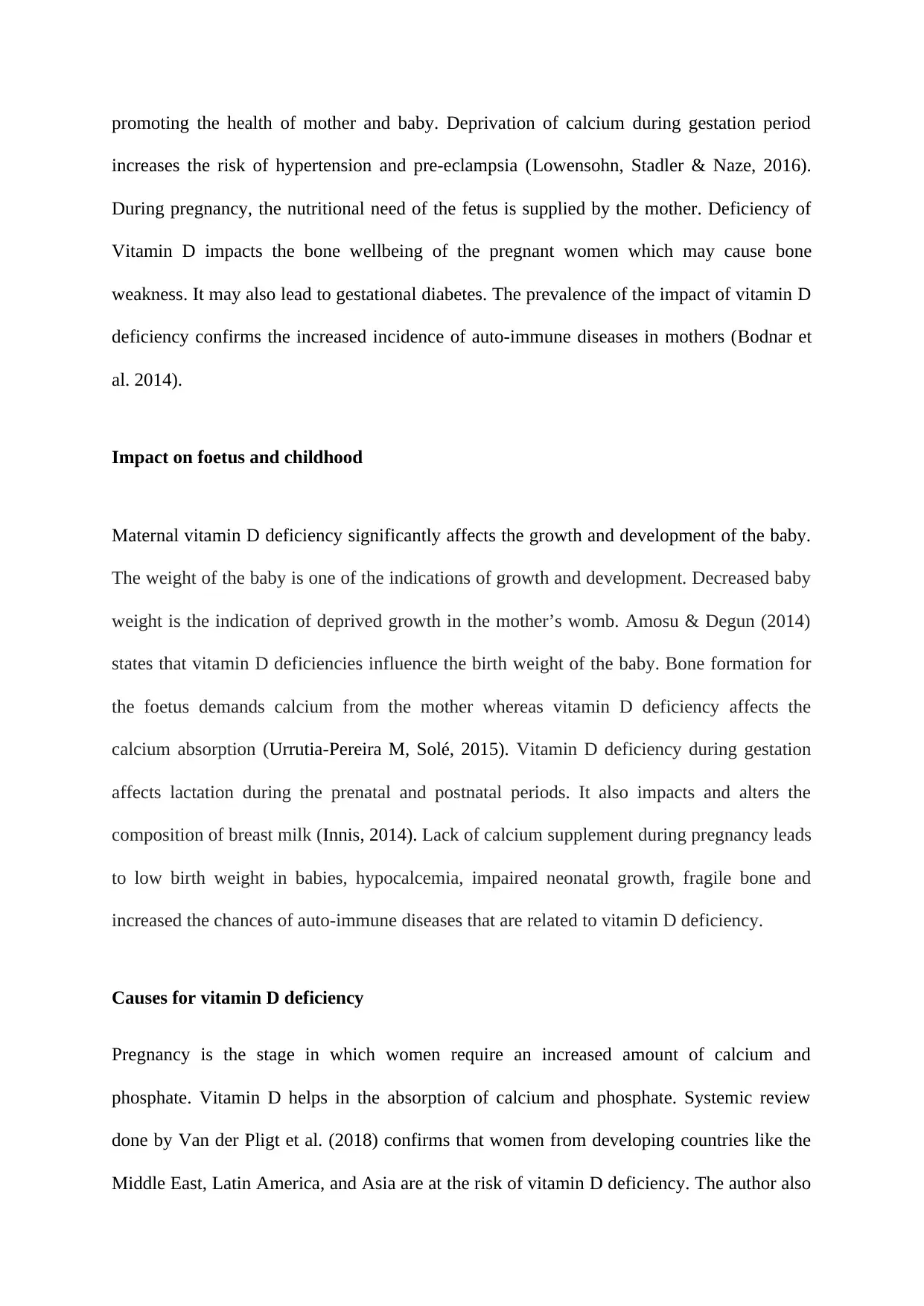
promoting the health of mother and baby. Deprivation of calcium during gestation period
increases the risk of hypertension and pre-eclampsia (Lowensohn, Stadler & Naze, 2016).
During pregnancy, the nutritional need of the fetus is supplied by the mother. Deficiency of
Vitamin D impacts the bone wellbeing of the pregnant women which may cause bone
weakness. It may also lead to gestational diabetes. The prevalence of the impact of vitamin D
deficiency confirms the increased incidence of auto-immune diseases in mothers (Bodnar et
al. 2014).
Impact on foetus and childhood
Maternal vitamin D deficiency significantly affects the growth and development of the baby.
The weight of the baby is one of the indications of growth and development. Decreased baby
weight is the indication of deprived growth in the mother’s womb. Amosu & Degun (2014)
states that vitamin D deficiencies influence the birth weight of the baby. Bone formation for
the foetus demands calcium from the mother whereas vitamin D deficiency affects the
calcium absorption (Urrutia-Pereira M, Solé, 2015). Vitamin D deficiency during gestation
affects lactation during the prenatal and postnatal periods. It also impacts and alters the
composition of breast milk (Innis, 2014). Lack of calcium supplement during pregnancy leads
to low birth weight in babies, hypocalcemia, impaired neonatal growth, fragile bone and
increased the chances of auto-immune diseases that are related to vitamin D deficiency.
Causes for vitamin D deficiency
Pregnancy is the stage in which women require an increased amount of calcium and
phosphate. Vitamin D helps in the absorption of calcium and phosphate. Systemic review
done by Van der Pligt et al. (2018) confirms that women from developing countries like the
Middle East, Latin America, and Asia are at the risk of vitamin D deficiency. The author also
increases the risk of hypertension and pre-eclampsia (Lowensohn, Stadler & Naze, 2016).
During pregnancy, the nutritional need of the fetus is supplied by the mother. Deficiency of
Vitamin D impacts the bone wellbeing of the pregnant women which may cause bone
weakness. It may also lead to gestational diabetes. The prevalence of the impact of vitamin D
deficiency confirms the increased incidence of auto-immune diseases in mothers (Bodnar et
al. 2014).
Impact on foetus and childhood
Maternal vitamin D deficiency significantly affects the growth and development of the baby.
The weight of the baby is one of the indications of growth and development. Decreased baby
weight is the indication of deprived growth in the mother’s womb. Amosu & Degun (2014)
states that vitamin D deficiencies influence the birth weight of the baby. Bone formation for
the foetus demands calcium from the mother whereas vitamin D deficiency affects the
calcium absorption (Urrutia-Pereira M, Solé, 2015). Vitamin D deficiency during gestation
affects lactation during the prenatal and postnatal periods. It also impacts and alters the
composition of breast milk (Innis, 2014). Lack of calcium supplement during pregnancy leads
to low birth weight in babies, hypocalcemia, impaired neonatal growth, fragile bone and
increased the chances of auto-immune diseases that are related to vitamin D deficiency.
Causes for vitamin D deficiency
Pregnancy is the stage in which women require an increased amount of calcium and
phosphate. Vitamin D helps in the absorption of calcium and phosphate. Systemic review
done by Van der Pligt et al. (2018) confirms that women from developing countries like the
Middle East, Latin America, and Asia are at the risk of vitamin D deficiency. The author also
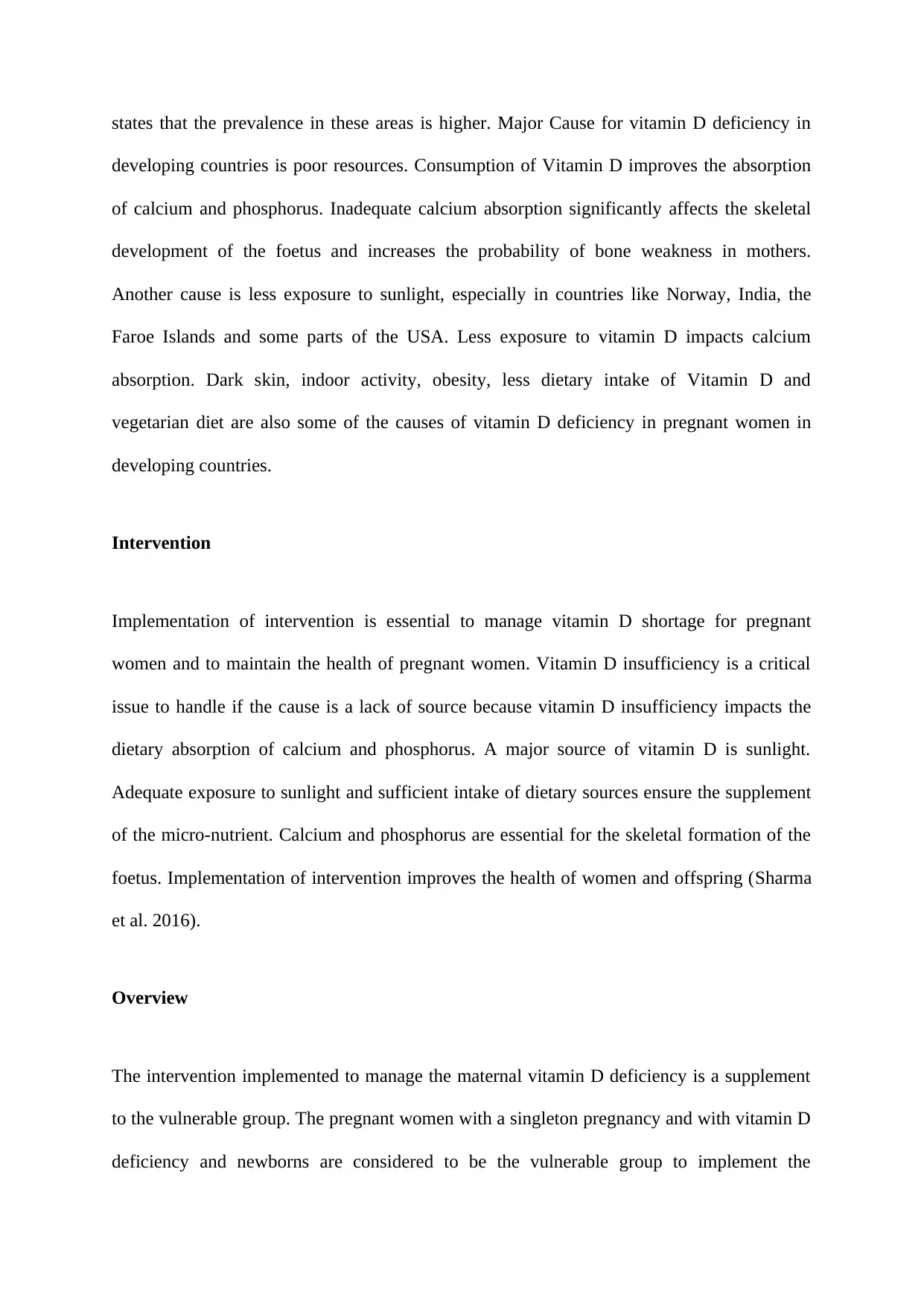
states that the prevalence in these areas is higher. Major Cause for vitamin D deficiency in
developing countries is poor resources. Consumption of Vitamin D improves the absorption
of calcium and phosphorus. Inadequate calcium absorption significantly affects the skeletal
development of the foetus and increases the probability of bone weakness in mothers.
Another cause is less exposure to sunlight, especially in countries like Norway, India, the
Faroe Islands and some parts of the USA. Less exposure to vitamin D impacts calcium
absorption. Dark skin, indoor activity, obesity, less dietary intake of Vitamin D and
vegetarian diet are also some of the causes of vitamin D deficiency in pregnant women in
developing countries.
Intervention
Implementation of intervention is essential to manage vitamin D shortage for pregnant
women and to maintain the health of pregnant women. Vitamin D insufficiency is a critical
issue to handle if the cause is a lack of source because vitamin D insufficiency impacts the
dietary absorption of calcium and phosphorus. A major source of vitamin D is sunlight.
Adequate exposure to sunlight and sufficient intake of dietary sources ensure the supplement
of the micro-nutrient. Calcium and phosphorus are essential for the skeletal formation of the
foetus. Implementation of intervention improves the health of women and offspring (Sharma
et al. 2016).
Overview
The intervention implemented to manage the maternal vitamin D deficiency is a supplement
to the vulnerable group. The pregnant women with a singleton pregnancy and with vitamin D
deficiency and newborns are considered to be the vulnerable group to implement the
developing countries is poor resources. Consumption of Vitamin D improves the absorption
of calcium and phosphorus. Inadequate calcium absorption significantly affects the skeletal
development of the foetus and increases the probability of bone weakness in mothers.
Another cause is less exposure to sunlight, especially in countries like Norway, India, the
Faroe Islands and some parts of the USA. Less exposure to vitamin D impacts calcium
absorption. Dark skin, indoor activity, obesity, less dietary intake of Vitamin D and
vegetarian diet are also some of the causes of vitamin D deficiency in pregnant women in
developing countries.
Intervention
Implementation of intervention is essential to manage vitamin D shortage for pregnant
women and to maintain the health of pregnant women. Vitamin D insufficiency is a critical
issue to handle if the cause is a lack of source because vitamin D insufficiency impacts the
dietary absorption of calcium and phosphorus. A major source of vitamin D is sunlight.
Adequate exposure to sunlight and sufficient intake of dietary sources ensure the supplement
of the micro-nutrient. Calcium and phosphorus are essential for the skeletal formation of the
foetus. Implementation of intervention improves the health of women and offspring (Sharma
et al. 2016).
Overview
The intervention implemented to manage the maternal vitamin D deficiency is a supplement
to the vulnerable group. The pregnant women with a singleton pregnancy and with vitamin D
deficiency and newborns are considered to be the vulnerable group to implement the
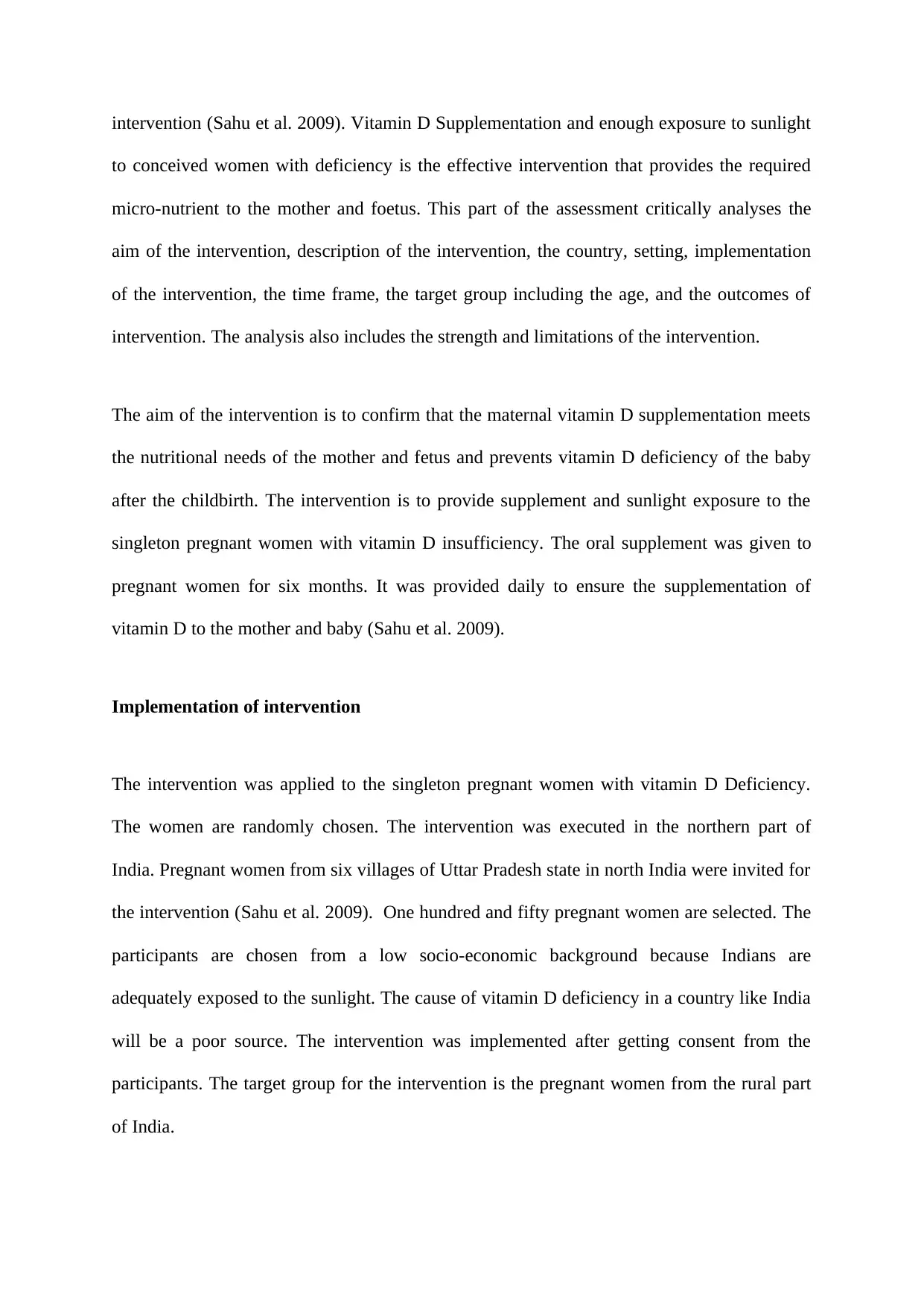
intervention (Sahu et al. 2009). Vitamin D Supplementation and enough exposure to sunlight
to conceived women with deficiency is the effective intervention that provides the required
micro-nutrient to the mother and foetus. This part of the assessment critically analyses the
aim of the intervention, description of the intervention, the country, setting, implementation
of the intervention, the time frame, the target group including the age, and the outcomes of
intervention. The analysis also includes the strength and limitations of the intervention.
The aim of the intervention is to confirm that the maternal vitamin D supplementation meets
the nutritional needs of the mother and fetus and prevents vitamin D deficiency of the baby
after the childbirth. The intervention is to provide supplement and sunlight exposure to the
singleton pregnant women with vitamin D insufficiency. The oral supplement was given to
pregnant women for six months. It was provided daily to ensure the supplementation of
vitamin D to the mother and baby (Sahu et al. 2009).
Implementation of intervention
The intervention was applied to the singleton pregnant women with vitamin D Deficiency.
The women are randomly chosen. The intervention was executed in the northern part of
India. Pregnant women from six villages of Uttar Pradesh state in north India were invited for
the intervention (Sahu et al. 2009). One hundred and fifty pregnant women are selected. The
participants are chosen from a low socio-economic background because Indians are
adequately exposed to the sunlight. The cause of vitamin D deficiency in a country like India
will be a poor source. The intervention was implemented after getting consent from the
participants. The target group for the intervention is the pregnant women from the rural part
of India.
to conceived women with deficiency is the effective intervention that provides the required
micro-nutrient to the mother and foetus. This part of the assessment critically analyses the
aim of the intervention, description of the intervention, the country, setting, implementation
of the intervention, the time frame, the target group including the age, and the outcomes of
intervention. The analysis also includes the strength and limitations of the intervention.
The aim of the intervention is to confirm that the maternal vitamin D supplementation meets
the nutritional needs of the mother and fetus and prevents vitamin D deficiency of the baby
after the childbirth. The intervention is to provide supplement and sunlight exposure to the
singleton pregnant women with vitamin D insufficiency. The oral supplement was given to
pregnant women for six months. It was provided daily to ensure the supplementation of
vitamin D to the mother and baby (Sahu et al. 2009).
Implementation of intervention
The intervention was applied to the singleton pregnant women with vitamin D Deficiency.
The women are randomly chosen. The intervention was executed in the northern part of
India. Pregnant women from six villages of Uttar Pradesh state in north India were invited for
the intervention (Sahu et al. 2009). One hundred and fifty pregnant women are selected. The
participants are chosen from a low socio-economic background because Indians are
adequately exposed to the sunlight. The cause of vitamin D deficiency in a country like India
will be a poor source. The intervention was implemented after getting consent from the
participants. The target group for the intervention is the pregnant women from the rural part
of India.
Secure Best Marks with AI Grader
Need help grading? Try our AI Grader for instant feedback on your assignments.
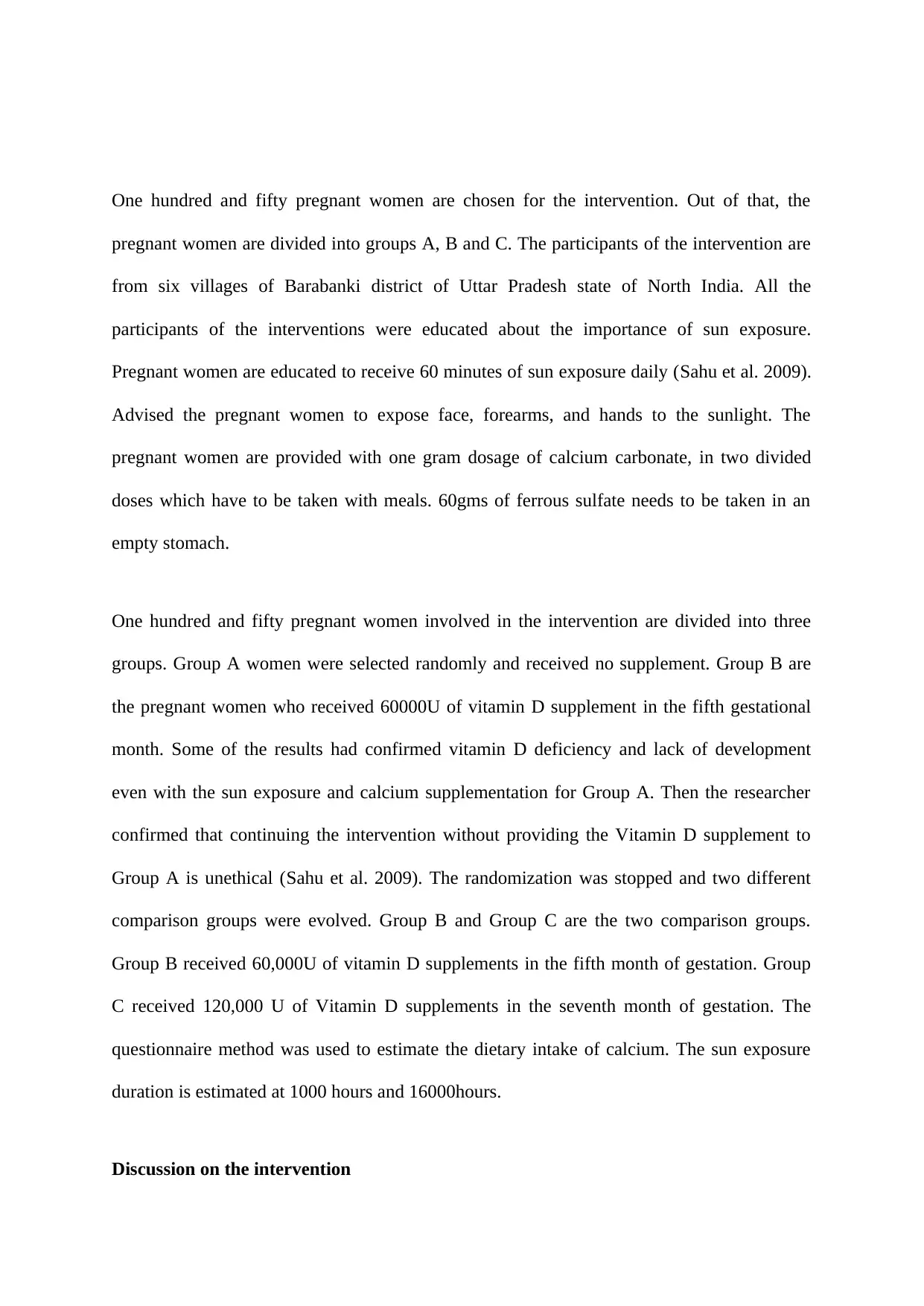
One hundred and fifty pregnant women are chosen for the intervention. Out of that, the
pregnant women are divided into groups A, B and C. The participants of the intervention are
from six villages of Barabanki district of Uttar Pradesh state of North India. All the
participants of the interventions were educated about the importance of sun exposure.
Pregnant women are educated to receive 60 minutes of sun exposure daily (Sahu et al. 2009).
Advised the pregnant women to expose face, forearms, and hands to the sunlight. The
pregnant women are provided with one gram dosage of calcium carbonate, in two divided
doses which have to be taken with meals. 60gms of ferrous sulfate needs to be taken in an
empty stomach.
One hundred and fifty pregnant women involved in the intervention are divided into three
groups. Group A women were selected randomly and received no supplement. Group B are
the pregnant women who received 60000U of vitamin D supplement in the fifth gestational
month. Some of the results had confirmed vitamin D deficiency and lack of development
even with the sun exposure and calcium supplementation for Group A. Then the researcher
confirmed that continuing the intervention without providing the Vitamin D supplement to
Group A is unethical (Sahu et al. 2009). The randomization was stopped and two different
comparison groups were evolved. Group B and Group C are the two comparison groups.
Group B received 60,000U of vitamin D supplements in the fifth month of gestation. Group
C received 120,000 U of Vitamin D supplements in the seventh month of gestation. The
questionnaire method was used to estimate the dietary intake of calcium. The sun exposure
duration is estimated at 1000 hours and 16000hours.
Discussion on the intervention
pregnant women are divided into groups A, B and C. The participants of the intervention are
from six villages of Barabanki district of Uttar Pradesh state of North India. All the
participants of the interventions were educated about the importance of sun exposure.
Pregnant women are educated to receive 60 minutes of sun exposure daily (Sahu et al. 2009).
Advised the pregnant women to expose face, forearms, and hands to the sunlight. The
pregnant women are provided with one gram dosage of calcium carbonate, in two divided
doses which have to be taken with meals. 60gms of ferrous sulfate needs to be taken in an
empty stomach.
One hundred and fifty pregnant women involved in the intervention are divided into three
groups. Group A women were selected randomly and received no supplement. Group B are
the pregnant women who received 60000U of vitamin D supplement in the fifth gestational
month. Some of the results had confirmed vitamin D deficiency and lack of development
even with the sun exposure and calcium supplementation for Group A. Then the researcher
confirmed that continuing the intervention without providing the Vitamin D supplement to
Group A is unethical (Sahu et al. 2009). The randomization was stopped and two different
comparison groups were evolved. Group B and Group C are the two comparison groups.
Group B received 60,000U of vitamin D supplements in the fifth month of gestation. Group
C received 120,000 U of Vitamin D supplements in the seventh month of gestation. The
questionnaire method was used to estimate the dietary intake of calcium. The sun exposure
duration is estimated at 1000 hours and 16000hours.
Discussion on the intervention
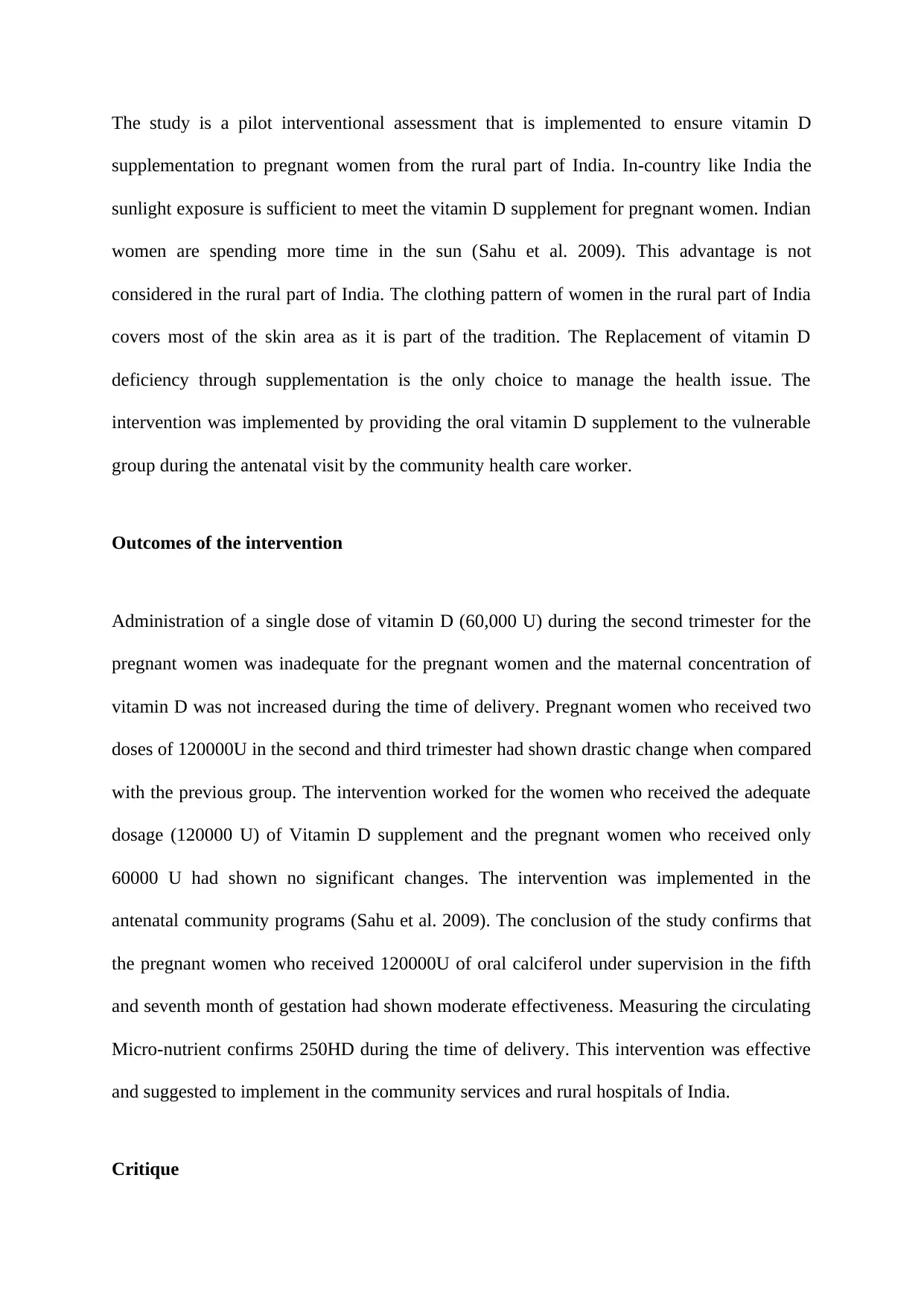
The study is a pilot interventional assessment that is implemented to ensure vitamin D
supplementation to pregnant women from the rural part of India. In-country like India the
sunlight exposure is sufficient to meet the vitamin D supplement for pregnant women. Indian
women are spending more time in the sun (Sahu et al. 2009). This advantage is not
considered in the rural part of India. The clothing pattern of women in the rural part of India
covers most of the skin area as it is part of the tradition. The Replacement of vitamin D
deficiency through supplementation is the only choice to manage the health issue. The
intervention was implemented by providing the oral vitamin D supplement to the vulnerable
group during the antenatal visit by the community health care worker.
Outcomes of the intervention
Administration of a single dose of vitamin D (60,000 U) during the second trimester for the
pregnant women was inadequate for the pregnant women and the maternal concentration of
vitamin D was not increased during the time of delivery. Pregnant women who received two
doses of 120000U in the second and third trimester had shown drastic change when compared
with the previous group. The intervention worked for the women who received the adequate
dosage (120000 U) of Vitamin D supplement and the pregnant women who received only
60000 U had shown no significant changes. The intervention was implemented in the
antenatal community programs (Sahu et al. 2009). The conclusion of the study confirms that
the pregnant women who received 120000U of oral calciferol under supervision in the fifth
and seventh month of gestation had shown moderate effectiveness. Measuring the circulating
Micro-nutrient confirms 250HD during the time of delivery. This intervention was effective
and suggested to implement in the community services and rural hospitals of India.
Critique
supplementation to pregnant women from the rural part of India. In-country like India the
sunlight exposure is sufficient to meet the vitamin D supplement for pregnant women. Indian
women are spending more time in the sun (Sahu et al. 2009). This advantage is not
considered in the rural part of India. The clothing pattern of women in the rural part of India
covers most of the skin area as it is part of the tradition. The Replacement of vitamin D
deficiency through supplementation is the only choice to manage the health issue. The
intervention was implemented by providing the oral vitamin D supplement to the vulnerable
group during the antenatal visit by the community health care worker.
Outcomes of the intervention
Administration of a single dose of vitamin D (60,000 U) during the second trimester for the
pregnant women was inadequate for the pregnant women and the maternal concentration of
vitamin D was not increased during the time of delivery. Pregnant women who received two
doses of 120000U in the second and third trimester had shown drastic change when compared
with the previous group. The intervention worked for the women who received the adequate
dosage (120000 U) of Vitamin D supplement and the pregnant women who received only
60000 U had shown no significant changes. The intervention was implemented in the
antenatal community programs (Sahu et al. 2009). The conclusion of the study confirms that
the pregnant women who received 120000U of oral calciferol under supervision in the fifth
and seventh month of gestation had shown moderate effectiveness. Measuring the circulating
Micro-nutrient confirms 250HD during the time of delivery. This intervention was effective
and suggested to implement in the community services and rural hospitals of India.
Critique
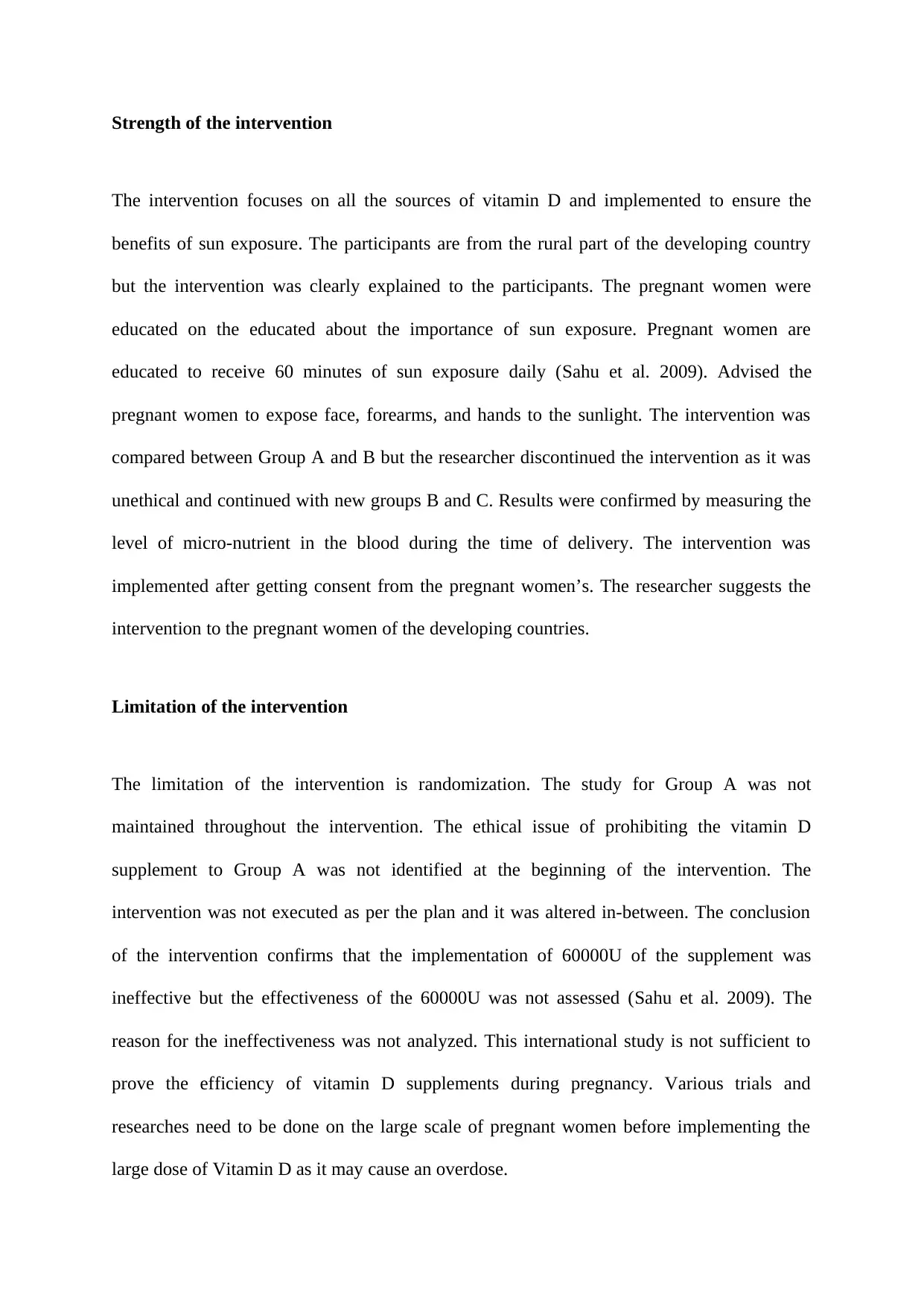
Strength of the intervention
The intervention focuses on all the sources of vitamin D and implemented to ensure the
benefits of sun exposure. The participants are from the rural part of the developing country
but the intervention was clearly explained to the participants. The pregnant women were
educated on the educated about the importance of sun exposure. Pregnant women are
educated to receive 60 minutes of sun exposure daily (Sahu et al. 2009). Advised the
pregnant women to expose face, forearms, and hands to the sunlight. The intervention was
compared between Group A and B but the researcher discontinued the intervention as it was
unethical and continued with new groups B and C. Results were confirmed by measuring the
level of micro-nutrient in the blood during the time of delivery. The intervention was
implemented after getting consent from the pregnant women’s. The researcher suggests the
intervention to the pregnant women of the developing countries.
Limitation of the intervention
The limitation of the intervention is randomization. The study for Group A was not
maintained throughout the intervention. The ethical issue of prohibiting the vitamin D
supplement to Group A was not identified at the beginning of the intervention. The
intervention was not executed as per the plan and it was altered in-between. The conclusion
of the intervention confirms that the implementation of 60000U of the supplement was
ineffective but the effectiveness of the 60000U was not assessed (Sahu et al. 2009). The
reason for the ineffectiveness was not analyzed. This international study is not sufficient to
prove the efficiency of vitamin D supplements during pregnancy. Various trials and
researches need to be done on the large scale of pregnant women before implementing the
large dose of Vitamin D as it may cause an overdose.
The intervention focuses on all the sources of vitamin D and implemented to ensure the
benefits of sun exposure. The participants are from the rural part of the developing country
but the intervention was clearly explained to the participants. The pregnant women were
educated on the educated about the importance of sun exposure. Pregnant women are
educated to receive 60 minutes of sun exposure daily (Sahu et al. 2009). Advised the
pregnant women to expose face, forearms, and hands to the sunlight. The intervention was
compared between Group A and B but the researcher discontinued the intervention as it was
unethical and continued with new groups B and C. Results were confirmed by measuring the
level of micro-nutrient in the blood during the time of delivery. The intervention was
implemented after getting consent from the pregnant women’s. The researcher suggests the
intervention to the pregnant women of the developing countries.
Limitation of the intervention
The limitation of the intervention is randomization. The study for Group A was not
maintained throughout the intervention. The ethical issue of prohibiting the vitamin D
supplement to Group A was not identified at the beginning of the intervention. The
intervention was not executed as per the plan and it was altered in-between. The conclusion
of the intervention confirms that the implementation of 60000U of the supplement was
ineffective but the effectiveness of the 60000U was not assessed (Sahu et al. 2009). The
reason for the ineffectiveness was not analyzed. This international study is not sufficient to
prove the efficiency of vitamin D supplements during pregnancy. Various trials and
researches need to be done on the large scale of pregnant women before implementing the
large dose of Vitamin D as it may cause an overdose.
Paraphrase This Document
Need a fresh take? Get an instant paraphrase of this document with our AI Paraphraser
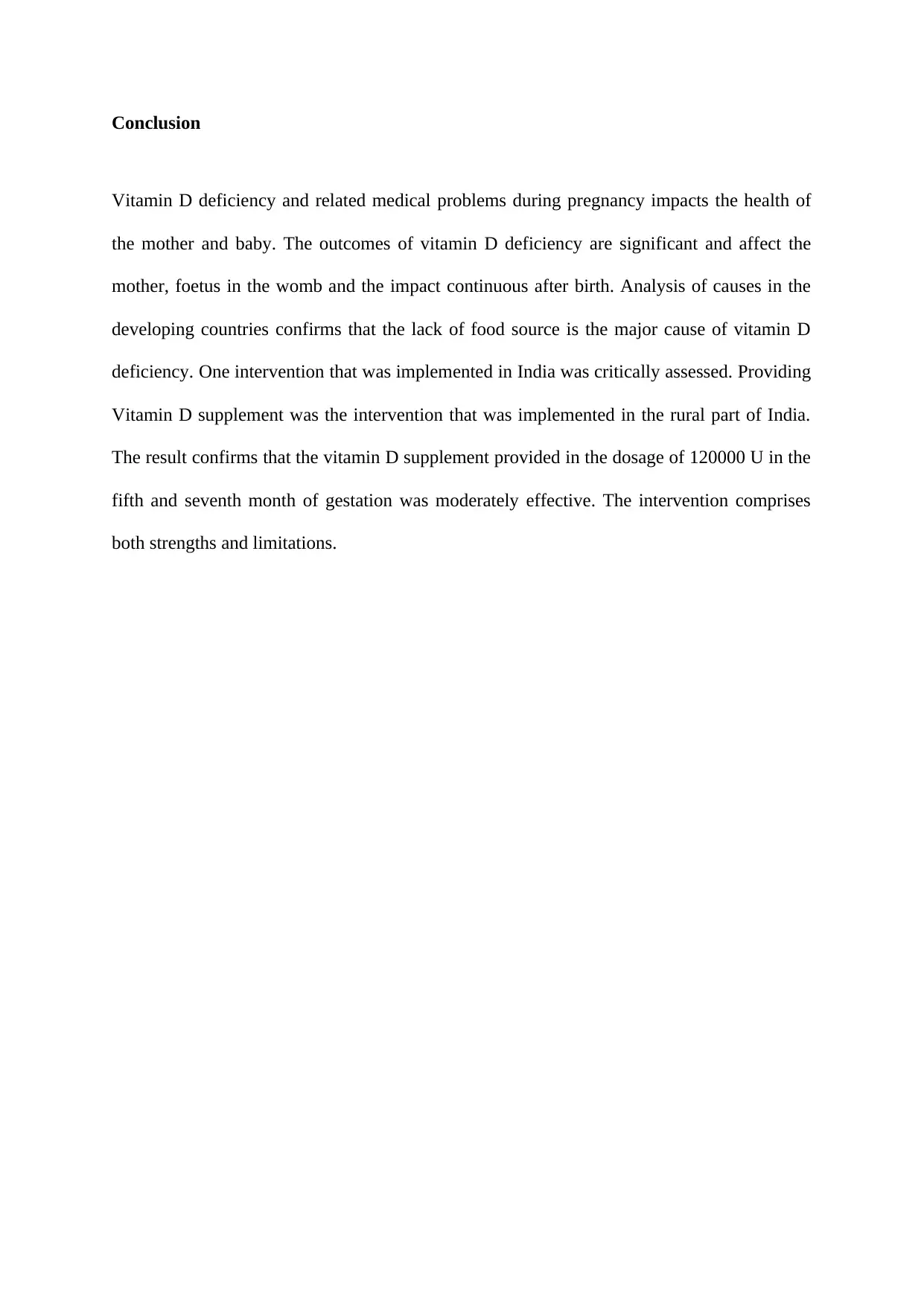
Conclusion
Vitamin D deficiency and related medical problems during pregnancy impacts the health of
the mother and baby. The outcomes of vitamin D deficiency are significant and affect the
mother, foetus in the womb and the impact continuous after birth. Analysis of causes in the
developing countries confirms that the lack of food source is the major cause of vitamin D
deficiency. One intervention that was implemented in India was critically assessed. Providing
Vitamin D supplement was the intervention that was implemented in the rural part of India.
The result confirms that the vitamin D supplement provided in the dosage of 120000 U in the
fifth and seventh month of gestation was moderately effective. The intervention comprises
both strengths and limitations.
Vitamin D deficiency and related medical problems during pregnancy impacts the health of
the mother and baby. The outcomes of vitamin D deficiency are significant and affect the
mother, foetus in the womb and the impact continuous after birth. Analysis of causes in the
developing countries confirms that the lack of food source is the major cause of vitamin D
deficiency. One intervention that was implemented in India was critically assessed. Providing
Vitamin D supplement was the intervention that was implemented in the rural part of India.
The result confirms that the vitamin D supplement provided in the dosage of 120000 U in the
fifth and seventh month of gestation was moderately effective. The intervention comprises
both strengths and limitations.
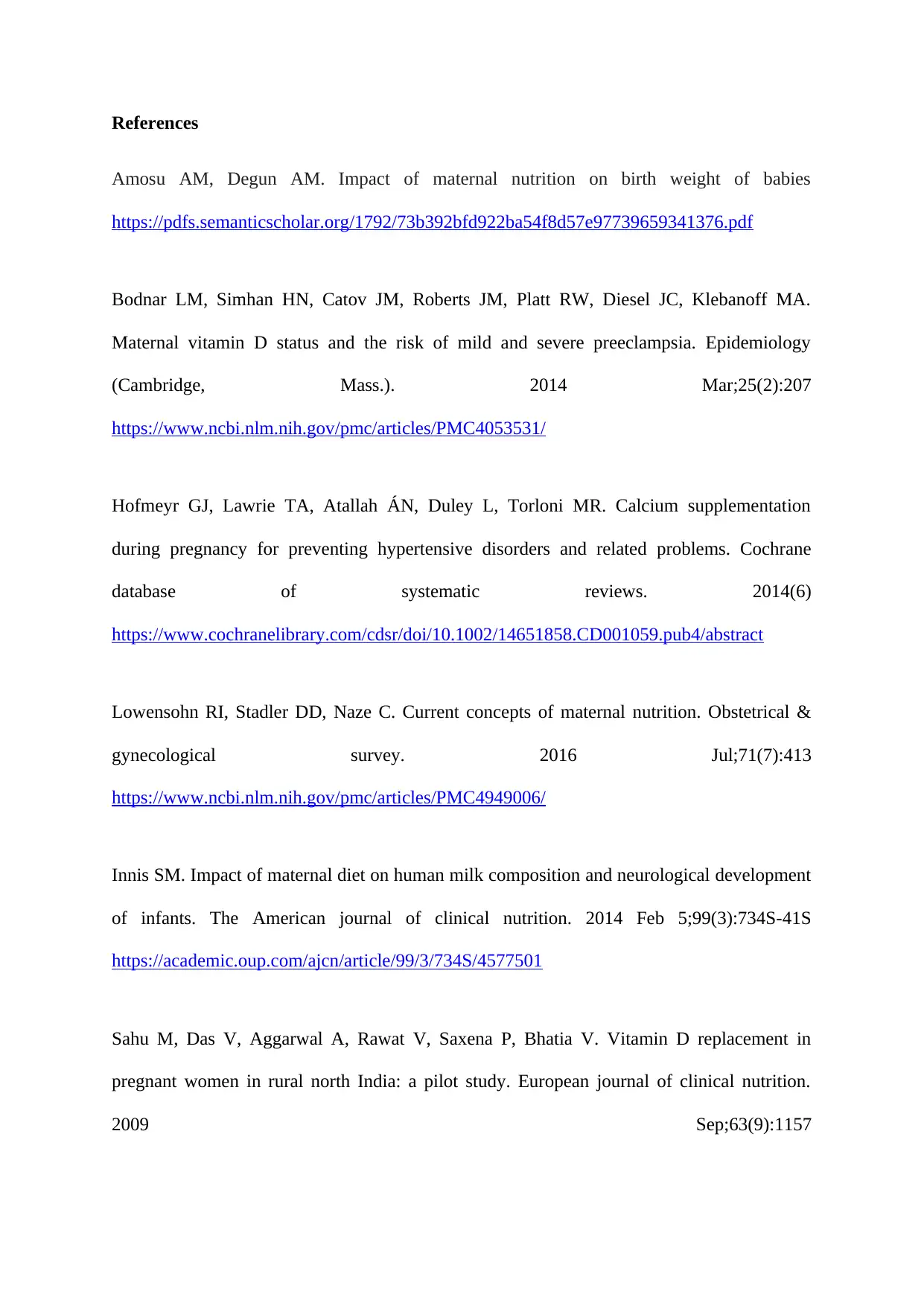
References
Amosu AM, Degun AM. Impact of maternal nutrition on birth weight of babies
https://pdfs.semanticscholar.org/1792/73b392bfd922ba54f8d57e97739659341376.pdf
Bodnar LM, Simhan HN, Catov JM, Roberts JM, Platt RW, Diesel JC, Klebanoff MA.
Maternal vitamin D status and the risk of mild and severe preeclampsia. Epidemiology
(Cambridge, Mass.). 2014 Mar;25(2):207
https://www.ncbi.nlm.nih.gov/pmc/articles/PMC4053531/
Hofmeyr GJ, Lawrie TA, Atallah ÁN, Duley L, Torloni MR. Calcium supplementation
during pregnancy for preventing hypertensive disorders and related problems. Cochrane
database of systematic reviews. 2014(6)
https://www.cochranelibrary.com/cdsr/doi/10.1002/14651858.CD001059.pub4/abstract
Lowensohn RI, Stadler DD, Naze C. Current concepts of maternal nutrition. Obstetrical &
gynecological survey. 2016 Jul;71(7):413
https://www.ncbi.nlm.nih.gov/pmc/articles/PMC4949006/
Innis SM. Impact of maternal diet on human milk composition and neurological development
of infants. The American journal of clinical nutrition. 2014 Feb 5;99(3):734S-41S
https://academic.oup.com/ajcn/article/99/3/734S/4577501
Sahu M, Das V, Aggarwal A, Rawat V, Saxena P, Bhatia V. Vitamin D replacement in
pregnant women in rural north India: a pilot study. European journal of clinical nutrition.
2009 Sep;63(9):1157
Amosu AM, Degun AM. Impact of maternal nutrition on birth weight of babies
https://pdfs.semanticscholar.org/1792/73b392bfd922ba54f8d57e97739659341376.pdf
Bodnar LM, Simhan HN, Catov JM, Roberts JM, Platt RW, Diesel JC, Klebanoff MA.
Maternal vitamin D status and the risk of mild and severe preeclampsia. Epidemiology
(Cambridge, Mass.). 2014 Mar;25(2):207
https://www.ncbi.nlm.nih.gov/pmc/articles/PMC4053531/
Hofmeyr GJ, Lawrie TA, Atallah ÁN, Duley L, Torloni MR. Calcium supplementation
during pregnancy for preventing hypertensive disorders and related problems. Cochrane
database of systematic reviews. 2014(6)
https://www.cochranelibrary.com/cdsr/doi/10.1002/14651858.CD001059.pub4/abstract
Lowensohn RI, Stadler DD, Naze C. Current concepts of maternal nutrition. Obstetrical &
gynecological survey. 2016 Jul;71(7):413
https://www.ncbi.nlm.nih.gov/pmc/articles/PMC4949006/
Innis SM. Impact of maternal diet on human milk composition and neurological development
of infants. The American journal of clinical nutrition. 2014 Feb 5;99(3):734S-41S
https://academic.oup.com/ajcn/article/99/3/734S/4577501
Sahu M, Das V, Aggarwal A, Rawat V, Saxena P, Bhatia V. Vitamin D replacement in
pregnant women in rural north India: a pilot study. European journal of clinical nutrition.
2009 Sep;63(9):1157
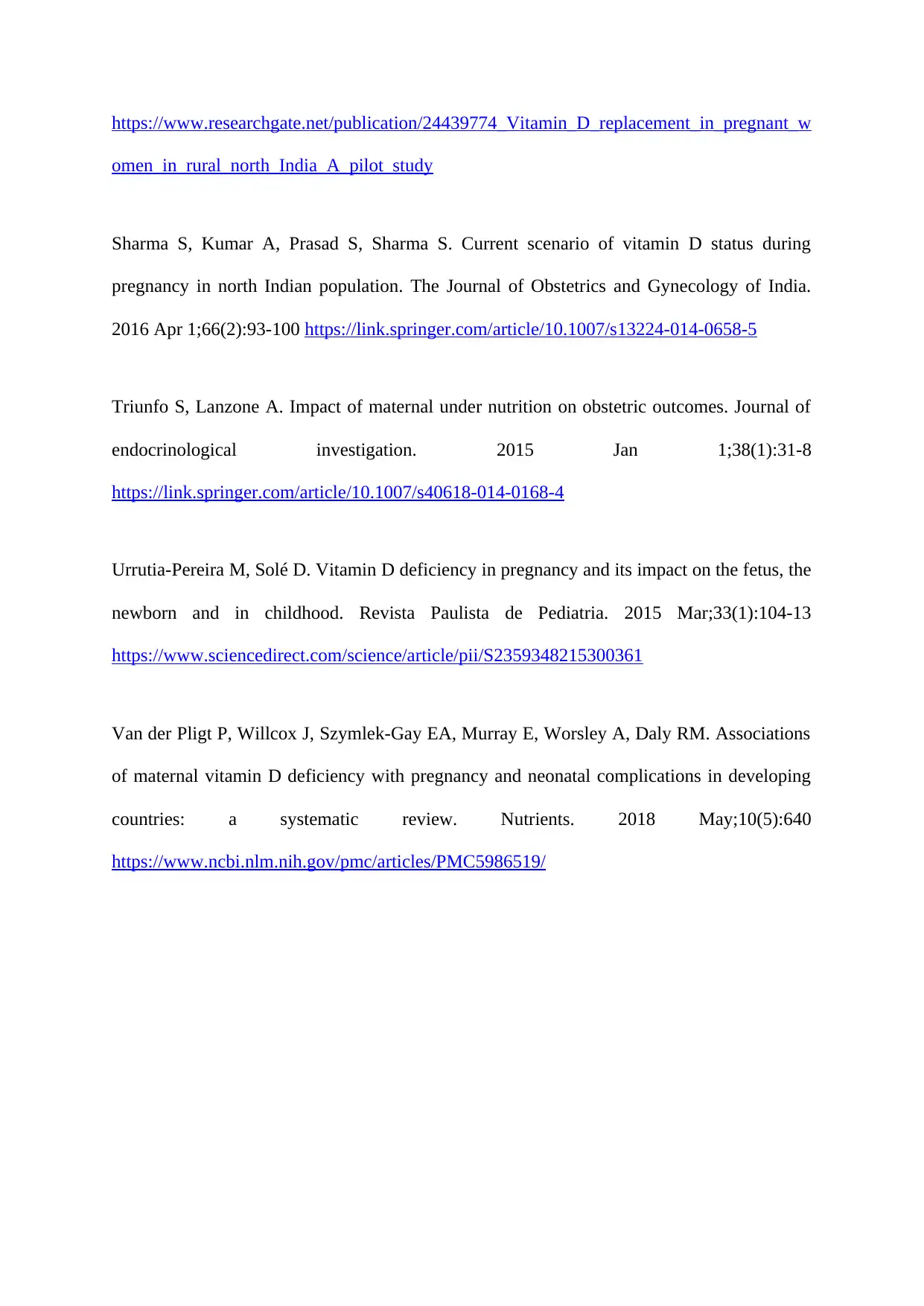
https://www.researchgate.net/publication/24439774_Vitamin_D_replacement_in_pregnant_w
omen_in_rural_north_India_A_pilot_study
Sharma S, Kumar A, Prasad S, Sharma S. Current scenario of vitamin D status during
pregnancy in north Indian population. The Journal of Obstetrics and Gynecology of India.
2016 Apr 1;66(2):93-100 https://link.springer.com/article/10.1007/s13224-014-0658-5
Triunfo S, Lanzone A. Impact of maternal under nutrition on obstetric outcomes. Journal of
endocrinological investigation. 2015 Jan 1;38(1):31-8
https://link.springer.com/article/10.1007/s40618-014-0168-4
Urrutia-Pereira M, Solé D. Vitamin D deficiency in pregnancy and its impact on the fetus, the
newborn and in childhood. Revista Paulista de Pediatria. 2015 Mar;33(1):104-13
https://www.sciencedirect.com/science/article/pii/S2359348215300361
Van der Pligt P, Willcox J, Szymlek-Gay EA, Murray E, Worsley A, Daly RM. Associations
of maternal vitamin D deficiency with pregnancy and neonatal complications in developing
countries: a systematic review. Nutrients. 2018 May;10(5):640
https://www.ncbi.nlm.nih.gov/pmc/articles/PMC5986519/
omen_in_rural_north_India_A_pilot_study
Sharma S, Kumar A, Prasad S, Sharma S. Current scenario of vitamin D status during
pregnancy in north Indian population. The Journal of Obstetrics and Gynecology of India.
2016 Apr 1;66(2):93-100 https://link.springer.com/article/10.1007/s13224-014-0658-5
Triunfo S, Lanzone A. Impact of maternal under nutrition on obstetric outcomes. Journal of
endocrinological investigation. 2015 Jan 1;38(1):31-8
https://link.springer.com/article/10.1007/s40618-014-0168-4
Urrutia-Pereira M, Solé D. Vitamin D deficiency in pregnancy and its impact on the fetus, the
newborn and in childhood. Revista Paulista de Pediatria. 2015 Mar;33(1):104-13
https://www.sciencedirect.com/science/article/pii/S2359348215300361
Van der Pligt P, Willcox J, Szymlek-Gay EA, Murray E, Worsley A, Daly RM. Associations
of maternal vitamin D deficiency with pregnancy and neonatal complications in developing
countries: a systematic review. Nutrients. 2018 May;10(5):640
https://www.ncbi.nlm.nih.gov/pmc/articles/PMC5986519/
1 out of 10
Related Documents
Your All-in-One AI-Powered Toolkit for Academic Success.
+13062052269
info@desklib.com
Available 24*7 on WhatsApp / Email
![[object Object]](/_next/static/media/star-bottom.7253800d.svg)
Unlock your academic potential
© 2024 | Zucol Services PVT LTD | All rights reserved.





